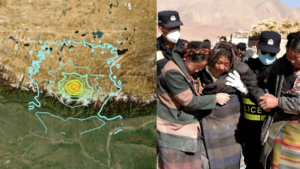Is it a cold or flu? It’s easy to confuse the symptoms of these two common respiratory illnesses. However, understanding the differences between them can help you make better decisions about your health and choose the right treatment options.

As the seasons change, many of us begin to experience that dreaded tickle in our throats, a runny nose, or the onset of body aches. While these symptoms are common, they often lead to the inevitable question: is it a cold or the flu? Understanding the difference between these two common respiratory illnesses can help you make informed decisions about your health and treatment options. In this comprehensive guide, we’ll delve into the distinctions between cold and flu, their causes, symptoms, prevention, and when to seek medical attention.
Understanding the Basics: What Are Cold and Flu?
The Common Cold
The common cold is a viral infection that mainly affects the upper respiratory system, which includes the nose and throat. It is one of the most widespread illnesses globally, with adults typically experiencing two to three colds per year. The cold is caused by various viruses, with rhinoviruses being the most common culprits. While the cold is generally mild, it can still cause significant discomfort.
Influenza (Flu)
The influenza virus is the cause of influenza, also referred to as the flu, which is a more serious respiratory disease. Unlike the cold, the flu can lead to serious health complications, especially in vulnerable populations such as the elderly, young children, and individuals with chronic health conditions. The flu virus has several strains, which can vary in severity from season to season, making annual flu vaccinations crucial.
Causes: The Viruses Behind Cold and Flu
Cold Viruses
The common cold is caused by over 200 different viruses, with rhinoviruses accounting for about 30-50% of all cases. Other viruses that can cause a cold include coronaviruses, respiratory syncytial virus (RSV), and parainfluenza virus. These viruses are highly contagious and can spread through airborne droplets when an infected person coughs or sneezes, as well as through contact with contaminated surfaces.
Flu Viruses
The influenza virus, which is a member of the Orthomyxoviridae family, is what causes the flu. Influenza viruses can be classified into four basic types: A, B, C, and D. However, only types A and B are responsible for the seasonal flu epidemics that occur each year. Influenza A viruses are further categorized into subtypes based on two proteins on the virus’s surface: hemagglutinin (H) and neuraminidase (N). For example, H1N1 and H3N2 are common subtypes of influenza A.
Symptom Comparison: How to Tell the Difference
Onset of Symptoms
- Cold: Symptoms of a cold typically develop gradually over a few days. You might start with a sore throat, followed by a runny or stuffy nose, and eventually, mild cough and congestion. Fevers are uncommon in adults but may occur in children.
- Flu: Flu symptoms tend to appear suddenly, often within a few hours. One moment you might feel fine, and the next, you’re hit with a high fever, chills, and severe body aches. The abrupt onset of symptoms is a hallmark of the flu.
Fever
- Cold: Fevers are rare in adults with a cold and, if present, are usually low-grade (below 100.4°F or 38°C). Children, however, may develop a mild fever.
- Flu: A high fever (often above 101°F or 38.3°C) is a common symptom of the flu. This fever frequently comes with chills and might linger for several days.
Body Aches and Fatigue
- Cold: Mild body aches and fatigue may occur, but they are generally not as severe as those experienced with the flu.
- Flu: Intense muscle and body aches are a defining feature of the flu. These aches can be severe and are often accompanied by profound fatigue that can last for weeks.
Cough
- Cold: A cough associated with a cold is usually mild and may produce phlegm. It’s often accompanied by a sore throat and nasal congestion.
- Flu: A flu-related cough is typically dry and can be severe, causing discomfort in the chest. The cough may persist for weeks, even after other symptoms have subsided.
Nasal Congestion and Sneezing
- Cold: Nasal congestion, sneezing, and a runny nose are classic symptoms of a cold. These symptoms are more prominent in a cold than in the flu.
- Flu: While nasal congestion can occur with the flu, it is usually less severe than with a cold. Sneezing is also less common with the flu.
Sore Throat
- Cold: A sore throat is often one of the first symptoms of a cold and can be quite bothersome.
- Flu: A sore throat may occur with the flu but is generally less severe than with a cold.
Headache
- Cold: Headaches are rare with a cold, but some people may experience mild discomfort due to sinus congestion.
- Flu: Headaches are common with the flu and can be severe, often contributing to the overall feeling of malaise.

Duration: How Long Do They Last?
Cold Duration
The symptoms of a cold typically last for about 7-10 days, although some symptoms like a cough or nasal congestion may linger for a couple of weeks. Most people recover without any complications.
Flu Duration
The flu generally lasts for about 5-7 days, but it can take weeks to fully recover, especially if complications arise. Fatigue and cough may persist for several weeks, even after other symptoms have resolved.
Complications: When Do Things Get Serious?
Cold Complications
While the common cold is usually mild and self-limiting, it can lead to complications in some cases. These may include:
- Sinusitis: Inflammation of the sinuses, which can cause prolonged congestion and facial pain.
- Ear Infections: Particularly in children, colds can lead to middle ear infections (otitis media).
- Asthma Exacerbation: Individuals with asthma may experience worsening symptoms during a cold.
Flu Complications
The flu can lead to more severe complications, especially in high-risk individuals. These may include:
- Pneumonia: A serious lung infection that can be life-threatening, especially in the elderly and those with weakened immune systems.
- Bronchitis: Inflammation of the bronchial tubes, leading to persistent coughing and difficulty breathing.
- Sinus and Ear Infections: Similar to cold complications, but potentially more severe.
- Exacerbation of Chronic Conditions: Individuals with chronic diseases like asthma, diabetes, or heart disease may experience worsening symptoms during the flu
Prevention: How to Protect Yourself
Cold Prevention
While there’s no surefire way to prevent the common cold, several strategies can reduce your risk:
- Good Hygiene: Wash your hands frequently with soap and water, especially after touching your face or common surfaces.
- Avoid Close Contact: Stay away from people who are sick, and avoid sharing utensils, cups, or other personal items.
- Boost Your Immune System: You can maintain a robust immune system with a good diet, frequent exercise, and enough sleep.
Flu Prevention
Preventing the flu involves similar strategies as preventing a cold, with the addition of the annual flu vaccine:
- Get Vaccinated: The flu vaccine is the most effective way to prevent the flu and its complications. It is advised for anyone above the age of six months.
- Practice Good Hygiene: Similar to cold prevention, regular handwashing, and avoiding close contact with sick individuals can help reduce your risk.
- Stay Home When Sick: If you develop flu symptoms, stay home to avoid spreading the virus to others.

Treatment: How to Manage Symptoms
Cold Treatment
There is no cure for the common cold, but you can manage symptoms with the following:
- Rest: Enough sleep enables your body to concentrate on combating the infection.
- Hydration: To stay hydrated and aid in mucus thinning, consume lots of water.
- Over-the-Counter Medications: Decongestants, antihistamines, and pain relievers like ibuprofen or acetaminophen can alleviate symptoms.
Flu Treatment
Flu treatment focuses on symptom management and preventing complications:
- Antiviral Medications: In some cases, your doctor may prescribe antiviral medications like oseltamivir (Tamiflu) to reduce the severity and duration of the flu.
- Rest and Hydration: Similar to cold treatment, rest and hydration are essential.
- Over-the-Counter Medications: Pain relievers and fever reducers can help manage symptoms, but avoid giving aspirin to children due to the risk of Reye’s syndrome.
When to Seek Medical Attention
For a Cold
Most colds are mild and don’t require medical attention. However, see a doctor if:
- Symptoms last longer than 10 days or worsen.
- You have a high fever that doesn’t improve with over-the-counter medications.
- You develop severe sinus pain or swelling.
For the Flu
Seek medical attention for the flu if:
- You experience difficulty breathing or chest pain.
- Your symptoms improve but then suddenly worsen.
- You have a high fever that will not go away with treatment.
- You belong to a high-risk group (e.g., elderly, pregnant, or have a chronic condition).
Conclusion: Stay Informed and Prepared
Knowing the difference between a cold and the flu is crucial for managing your health effectively. While both illnesses share some similarities, they differ significantly in their severity, symptoms, and potential complications. By understanding these differences, you can take the appropriate steps to prevent, treat, and seek help when necessary. Remember, prevention through good hygiene and vaccination is key to staying healthy during cold and flu season.
This guide aims to provide a clear and comprehensive understanding of these common illnesses, empowering you to make informed decisions for yourself and your loved ones. Stay vigilant, stay healthy, and don’t hesitate to seek medical advice if you’re unsure about your symptoms.
Read Next:

The Psychology of Love: Why Valentines Day Matters More Epic Than You Think
Discover the psychology of love and why Valentines Day is more important than you think. Learn how love impacts the brain, strengthens relationships, and boosts

Premier League Highlights: Arsenal Humiliate Man City 5-1, Spurs and Palace Secure Crucial Wins
Arsenal demolished Manchester City 5-1 in a statement premier league highlights win, reigniting their title hopes. Meanwhile, Crystal Palace stunned Man United 2-0, and Tottenham

How Budget 2025 Impacts the Indian Middle-Class: Major Tax Benefits and Glaring Omissions
Budget 2025 offers major tax relief to the middle class, including zero tax on incomes up to ₹12 lakh. However, it misses out on incentives

Degrees vs Employability: Why “Highly Qualified Degree Holders” Struggle to Find Jobs While “Less Qualified Individuals” Get Hired Faster!
Many highly qualified individuals struggle to secure jobs, while less qualified candidates get hired quickly. This Degrees vs Employability paradox is caused by employer preferences,

The Power of Mindset: Why Looking Poor Doesn’t Make You Poor, but Thinking Poor Does!
Discover why looking poor doesn’t define your wealth but thinking poor does. Learn the power of mindset and how a growth-oriented mindset can lead to

Overthinking: How It’s Damaging Today’s Youth – Causes and Cure in 2025
Understanding how overthinking is silently damaging today’s youth, from its causes rooted in societal pressure and social media to its long-term effects on mental health.

Netaji Subhash Chandra Bose: An Epitome of Epic Leadership
Discovering the incredible life of Netaji Subhash Chandra Bose, a leader whose vision, courage, and determination redefined India’s freedom struggle. Explore his leadership qualities, ideology,

Global News Headlines Today: From Gaza Ceasefire to Blue Origin’s Massive 2025 Milestone
Explore today’s top global news headlines, from the Gaza ceasefire and Blue Origin’s historic spaceflight to Apple losing its top spot in China’s smartphone market.

The Hidden Danger of Social Media Nudity: A Threat to Today’s Youth in 2025
Understanding how social media nudity is impacting the youth and their future potential. Learn about the risks of unregulated content, cultural sensitivities, and solutions for

FA Cup 2024: Manchester United Survive Arsenal Test to Advance in FA Cup Fourth Round
Manchester United defeated Arsenal in a thrilling FA Cup third-round encounter, with Atlay Bayindir’s heroics sealing the win. Read about key moments, standout performances, and

Supercopa de España: Barcelona Dominate Real Madrid 5-2 to Claim Supercup
Barcelona delivered a stunning 5-2 victory over Real Madrid in the Supercopa de España final. Read about the key moments, star players, and the significance

Global News Highlights Today: India’s Metro Milestone, US Aid Shift, iOS Stunning Updates and More!
Explore today’s global news highlights, including the Tibet earthquake, political tensions in South Korea, LA wildfires, US aid shifts, and India’s metro milestone. Stay informed

The Power of Keeping Plans Private in 2025: Why Silence is the Key to Achieving Your Dreams!
Discover why keeping plans private is crucial for achieving your dreams. Learn how silence boosts focus, protects momentum, and helps you achieve success without distractions

Rolls-Royce Ghost Series II Arrives in India 2025: Elegance Meets Stunning Innovation
Discover the all-new Rolls-Royce Ghost Series II launched in India, priced from ₹8.95 crore. Explore its stunning design, luxurious interior, enhanced tech features, and powerful

Global News Highlights: Earthquakes in Tibet, US Bird Flu Crisis Fatality, Brics Welcomes Indonesia in 2025, and Many more
Explore this week’s global news highlights, including the first bird flu death in the US, Indonesia joining Brics, devastating earthquakes in Tibet, rising HMPV cases
